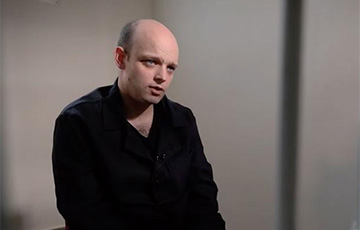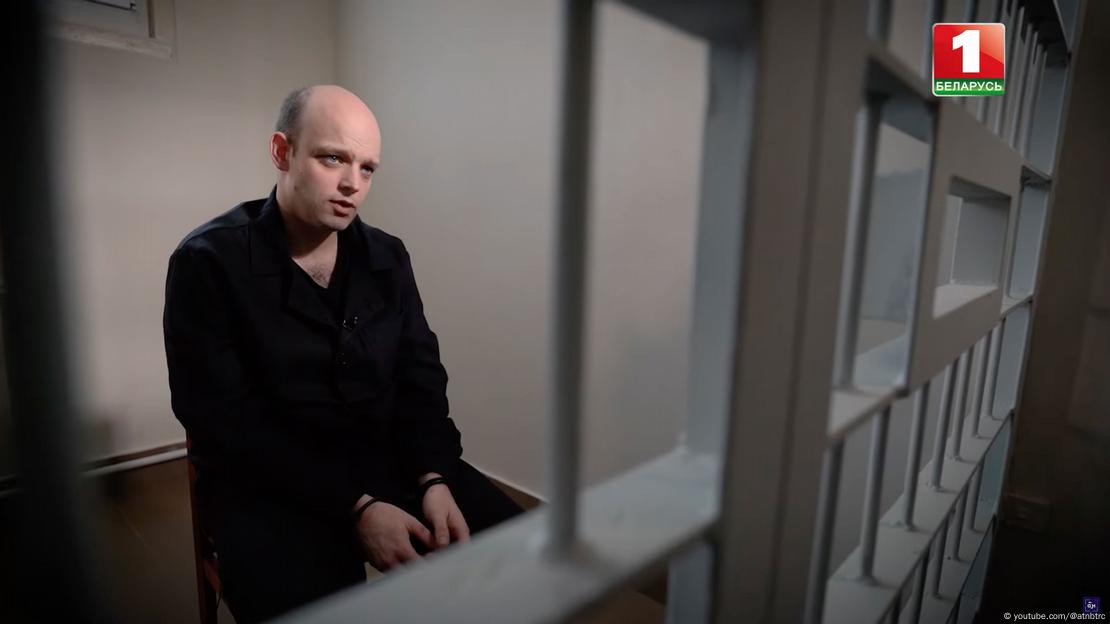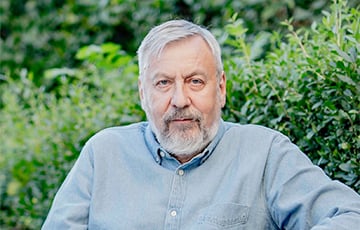‘99% Confidence This Was KGB Operation’
13- 27.07.2024, 9:46
- 19,264

The media found inconsistencies in the biography of a German citizen sentenced to death in Belarus.
On July 25, Belarusian state television showed a story about German citizen Rico K. While behind bars in handcuffs, he tells his biography and details of how he allegedly flew to Belarus and what tasks he allegedly carried out. From the story it follows that he was sentenced to death for two photos of military facilities and a backpack with explosives, which he allegedly placed on the railway tracks. At the same time, he repeatedly emphasizes that the German authorities do not respond to his requests for help. Neither Rico K. nor his lawyer appealed the sentence, the court decision entered into legal force. What became clear a week later about the case of the German citizen sentenced to death? What is official Minsk trying to achieve? And what inconsistencies in K.'s biography did Deutsche Welle manage to discover?
A biography that doesn't add up
Initially, all that was known about Rico K. was what he himself had indicated in his LinkedIn profile. There are two pages on the social network with identical data and photos, both of which were created at about the same time, in August 2023.
He described his biography as follows: he received a professional education as a car mechanic, after which, from October 2014 to September 2017, he worked as a security officer at the US Embassy in Berlin. Then, according to his own information, he changed his occupation and spent three years caring for residents of a nursing home in Oranienburg. In June 2021, he transferred to work as a paramedic at the German Red Cross in Lower Saxony.
As DW was able to find out, not all of the information he provided is true.
Most likely, Rico K. really was engaged in the guarding of the US Embassy in Berlin. But not three years, but much less — in 2015-2016. At the same time, he was not an employee of the embassy, but worked for a company that guards “particularly important objects”, as indicated on its website.
According to Rico K.'s resume, in 2019 he was employed at a nursing home in Oranienburg. However, according to DW, at least in October 2019, he worked in the sales department of AFT Vertrieb und Service, which, among other things, sold Husqvarna lawn mowers. He may have joined the company in the summer of 2019: in August of that year, “Mr. K.” was introduced on Facebook as “our new man in the sales department”. In the autumn of 2019, AFT Vertrieb und Service was one of the sponsors of the Potsdam women's football team — this was confirmed in a conversation with DW by Uwe Reher, a member of the board of the Turbine club.
DW managed to find a photo of Rico K. taken in October 2019. In it, a man resembling K. poses with football fans and lawn mowers; K. himself is wearing a sweater with the Husqvarna logo.

Representatives of the nursing home in Oranienburg refused to speak to Deutsche Welle. The German Red Cross confirmed to DW that Rico K. worked as a paramedic in the regional office of the organization in Salzgitter. However, they refused to specify at what time he was their employee. Journalists from Der Tagesspiegel found former colleagues of Rico K. from Salzgitter. According to them, in October 2023, K. “simply did not come to work anymore and disappeared.” A few days later, one of his family members informed the Red Cross that the man was in prison in Belarus.
“He told a lot of wild stories that you never know if they're true,” one of his former colleagues describes Rico K. According to him, K. talked about his work at the US embassy and hoped that it would help him get a green card to move to America.
“99% confidence that it was a KGB operation”
How Rico K. ended up in Belarus remains unclear. The state TV channel Belarus 1, which showed the video of the convicted German citizen, claims that he arrived on October 2 from Germany allegedly via Azerbaijan.
The actions for which he was tried look like a provocation by the Belarusian or Russian special services. This is the version supported by the “Belarusian Railway Workers' Community”. It was one of the first to report the explosion at the Aziaryshcha station — allegedly, it was for these events that Rico K. was convicted.
“There is 99% [confidence] that it was a KGB operation,” the community told DW. “We judge by the activity of the law-enforcers before and after the explosion.” The community also points to the time of the explosion, which occurred when there was practically no traffic on the tracks, as well as the location of the explosive device — between the tracks. “There was almost no damage to the infrastructure,” the community notes.
Germany does not intend to play by the Belarusian-Russian rules?
These are just a few of the many details that remain unclear in the Rico K. case, emphasizes political analyst Aliaksandr Friedman.
On July 25, the Belarusian authorities showed a story on state TV about a German citizen sentenced to death. According to Friedman, this indicates that the Belarusian authorities “went on the offensive”.
“This looks like an attempt to force the German side to enter into a dialogue and play by the Belarusian-Russian rules,” the analyst believes.
Aliaksandr Friedman supports the hypothesis, which is also voiced by many German analysts, that the detention of Rico K. is a Russian combination: “Most likely, we are dealing with an attempt by Russia to get Vadim Krasikov, sentenced to life imprisonment in Germany. Lukashenka is only the executor.”
At the same time, Friedman draws attention to the fact that representatives of the German government do not officially comment on the exchange issue: publicly, they only condemn the death sentence and demand a fair trial in the case of the German citizen. Thus, on July 24, Chancellor Olaf Scholz refused to comment on the possible exchange at a press conference, citing the principle of observing state interests. On July 26, the Deputy Spokesperson for the German Government, Christiane Hoffman, acted in a similar manner.
“The propaganda story contains appeals from Rico K. to Scholz and the German President. The common thread is “talk to the Belarusians, accept their conditions.” Apparently, the German side is ignoring the proposals of the Republic of Belarus and is not going to exchange Krasikov,” says Aliaksandr Friedman. “For Germany, handing over Krasikov is a very difficult and unpleasant decision. The hypothesis that the demands include easing sanctions is untenable: after all, the sanctions are European. This is also a dilemma for Lukashenka. It sounds cynical, but if he shoots Rico K. dead, what will he get? Nothing. I think they understand this very well in Berlin.”
Letter from Baerbock to Ryzhankou
Der Spiegel, citing sources in the German Foreign Ministry, reports that in early July, Foreign Minister Annalena Baerbock sent a letter to Maksim Ryzhankou, the head of the Belarusian Foreign Ministry appointed to this position on June 27, 2024, shortly after the sentencing of Rico K. In the letter, she called for a fair procedure for appealing the sentence, and demanded that its execution be stopped. Otherwise, this will lead to serious consequences in relations between Minsk and Berlin, journalists report the essence of the letter. According to them, the German Foreign Minister has not yet received a response.
Even before the verdict of Rico K. became publicly known, the German Foreign Ministry updated its travel recommendations to Belarus: they included information that arbitrary arrests “on far-fetched pretexts” and long prison terms in harsh conditions are possible in Belarus, and in the case of more serious charges, even the death penalty.
Chargé d'affaires of Germany Michael Nowak also left Minsk — the news that his mission had ended appeared on the embassy's social media on July 10. He worked in this position for less than a year. Usually, the appointment of a temporary chargé d'affaires occurs during the absence of the ambassador: this can be either one day or several years, the former diplomat explained to DW. If the temporary chargé d'affaires is replaced, a new one must be appointed in their place. Nothing is known about this yet.











